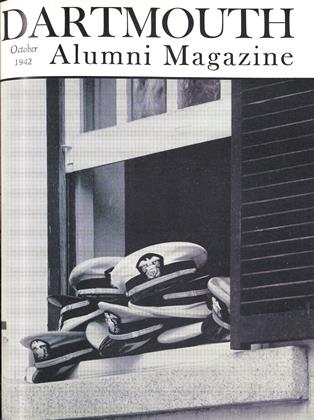LAWYERS AND THE CONSTITUTION: HOW LAISSEZ FAIRE CAME TO THE SUPREME COURT
October 1942 Robert K. Carr '29LAWYERS AND THE CONSTITUTION: HOW LAISSEZ FAIRE CAME TO THE SUPREME COURT Robert K. Carr '29 October 1942
SUPREME COURT, by Benjamin R. Twiss'34. Princeton University Press, 1942, 271 pp. $3.00.
I I ITS THIS REVIEWER NEVER had the privilege of knowing the late Ben Twiss who at the time of his tragic death at the age of a 8 was teaching political science at Hobart College. Judged by the uniform comment of those who knew him socially, his was a rare type of friendship to be highly prized. Judging by a reading of Mr. Twiss' posthumous volume it is apparent that the Dartmouth fellowship has lost a brilliant scholar who possessed a talent that was both solid and imaginative.
Lawyers and the Constitution is an exposition of the thesis "The development of law, whether written or unwritten, is primarily the work of the lawyer. It is the adoption by the judge of what is proposed at the bar." More specifically, Mr. Twiss has taken the work of the United States Supreme Court between 1890 and 1935, one of the most strongly conservative periods in the Court's history, and examined it in the light of this thesis. Analyzing in much detail the speeches, legal treatises and case briefs of some eight or ten of the most influential lawyers of the period Mr. Twiss first shows the close association that existed between the ideas held by these lawyers and the dominant conservative business philosophy of the day, and then proceeds to prove the considerable extent to which the Supreme Court drew upon these ideas in the rendering of the great constitutional decisions of the period.
Professor E. S. Corwin, the great professor of constitutional law at Princeton, prepared the volume for publication and also wrote a foreword for it. Dartmouth men will appreciate the high praise he bestows: "Ben's was a rare, an exhilarating nature, one which combined great gifts of mind and character with unusual charm of personality. As student, athlete, companion, and friend, he had won the love and admiration of hosts of his elders and of his contemporaries alike. In the presence of the world tragedy, so much of the weight of which falls upon the inexperienced shoulders of our young men, it is consoling to realize from this example that length of life is not always essential to completeness of living. Short as his life was, Ben Twiss lived successfully."
 View Full Issue
View Full Issue
More From This Issue
-
 Article
Article'Round the Girdled Earth
October 1942 By John French JR. '30 -
 Lettter from the Editor
Lettter from the EditorLetters from Tom Braden '40
October 1942 -
 Article
ArticlePresident's Address Opens 174th College Year
October 1942 -
 Article
ArticleDartmouth War Directory
October 1942 -
 Article
ArticlePay-As-You-Go Taxation
October 1942 By BEARDSLEY RUML '15 -
 Class Notes
Class Notes1918*
October 1942 By ERNEST H. EARLEY, DONALD L. BARR
Robert K. Carr '29
Books
-
 Books
BooksAlumni Publications
January 1945 -
 Books
BooksTHE CANYON
November 1940 By Charles Bolte '41 -
 Books
BooksPROPAGANDA-ITS PSYCHOLOGY AND TECHNIQUE
February 1936 By Henry S. Odbert '30 -
 Books
BooksALBERT INSKIP DICKERSON: SELECTED WRITINGS
November 1974 By JAMES L. FARLEY '42 -
 Books
BooksCAUSAL INFERENCES IN NON EXPERIMENTAL RESEARCH.
APRIL 1965 By ROBERT SOKOL -
 Books
BooksTHE WELFARE STATE
December 1950 By VIRGINIA L. CLOSE




